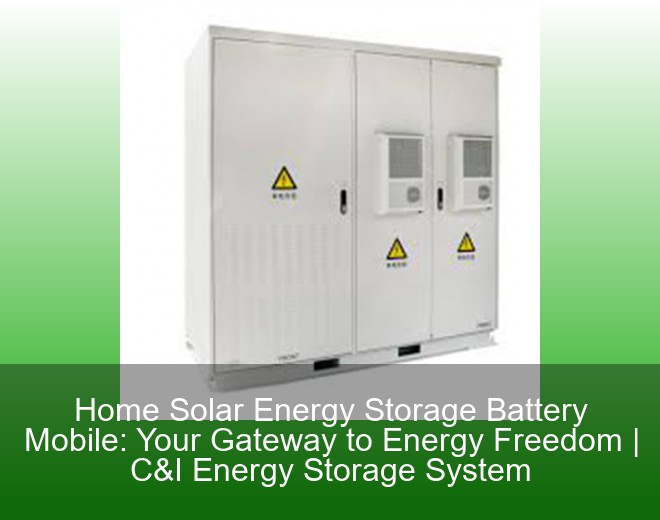
Let's face it – traditional batteries are like needy pets. They require constant attention, regular watering (literally, in lead-acid types), and still might let you down during critical moments. Enter the valve regulated sealed energy storage battery (VRLA), the low-maintenance superhero of power solutions. These batteries are quietly revolutionizing everything from solar farms to hospital backup systems, and here's why you should care. [2025-05-30 16:55]

Let’s face it – when you hear “lead-acid battery,” you probably picture that grumpy car battery refusing to start your SUV on a cold morning. But lead-acid household energy storage has been quietly powering homes longer than TikTok dances have existed. Invented in 1859 by French physicist Gaston Planté (who clearly didn’t get the memo about “work-life balance”), these batteries have evolved from clunky automotive relics to modern energy storage contenders [3]. [2022-03-09 17:51]

Let's face it – when most people hear "lead-acid battery classification," they picture dusty textbooks and engineering jargon. But what if I told you understanding these lead-acid energy storage battery classifications could save your solar project $10,000? From powering your neighbor's off-grid cabin to supporting massive wind farms, these unsung heroes handle temperatures that'd make your smartphone cry (-30°C to 60°C, no less!) while keeping the lights on[1][6]. [2021-04-27 07:34]

Let’s face it – energy storage batteries aren’t exactly dinner table conversation starters. But when your solar-powered toaster suddenly turns into a $500 paperweight during a blackout, you’ll wish you’d paid attention. From powering homes to stabilizing national grids, energy storage batteries are the unsung heroes of our electrified world. Let’s break down the battery zoo without putting you to sleep. [2019-08-17 23:50]

It's 8 PM, your solar panels have clocked out for the day, and your Netflix binge suddenly turns into a real-life blackout drama. Enter home solar energy storage batteries – the unsung heroes that keep your lights on when the sun takes a coffee break. These mobile power banks for your house are rewriting the rules of energy independence, one charged electron at a time. [2025-08-04 16:08]

Let's be real – when's the last time you marveled at the exterior of an energy storage cabinet? But here's the kicker: the shell material is like the bouncer at a VIP club, silently determining what dangers get past the velvet rope. From scorching desert solar farms to humid coastal wind parks, new energy storage cabinet shell materials work overtime to protect those precious lithium-ion batteries. [2025-07-01 02:27]

Ever wondered how your solar panels keep your Netflix binge going after sunset? Enter battery energy storage systems (BESS) – the unsung heroes of our renewable energy revolution. These technological marvels don't just store electricity; they're reshaping how we power our world, from stabilizing national grids to keeping your smart fridge humming during blackouts. [2025-06-28 07:41]

an island nation harnessing volcanic heat and tropical sunshine to power mines through sand-like materials that "freeze" energy. Welcome to Madagascar's energy revolution, where phase change energy storage devices are rewriting the rules of industrial power. These thermal batteries – using materials that store energy by changing physical states – are making waves in projects like the GALLOIS graphite mine's hybrid energy system[1]. [2025-06-10 03:20]

Let’s face it—climate change isn’t just knocking on our door; it’s already rearranging the furniture. As industries scramble to slash emissions, two game-changers are stealing the spotlight: carbon-neutral basic materials and next-gen energy storage systems. These aren’t just buzzwords; they’re the backbone of a cleaner, greener economy. From lithium-ion batteries to mind-bending innovations like gravity storage, this blog unpacks how these technologies are rewriting the rules of sustainability. Buckle up—it’s going to be a wild ride. [2025-05-22 17:00]

This article targets renewable energy professionals, grid operators, and tech-savvy investors hungry for energy storage trends 2025. Think of it as a backstage pass to the industry’s latest innovations – we’re talking engineers who geek out over battery chemistry, project developers chasing cost efficiencies, and policymakers shaping tomorrow’s energy grids. Bonus points if you’ve ever argued about thermal management at a cocktail party. [2025-05-01 17:22]

Imagine your energy storage system growing as your needs do—sounds like sci-fi? Not anymore. The energy storage module stacking diagram concept is revolutionizing how homes and businesses manage power. Think of it like LEGO bricks for electricity: snap together what you need today, add more blocks tomorrow. SolarFlow's modular system, for instance, lets users start with 2kWh and scale to 10kWh simply by stacking extra battery modules [1]. No more paying for unused capacity! [2025-04-25 12:08]

Ever wondered how Cameroon’s growing energy sector keeps its storage tanks from turning into modern-day sieves? The secret lies in welding – that magical process of making metal stick together better than peanut butter and jelly. In Cameroon’s push for energy independence[4], proper welding techniques for storage tanks aren’t just important – they’re what stands between stable power supply and industrial chaos. [2025-04-21 07:36]
Enter your inquiry details, We will reply you in 24 hours.
Brand promise worry-free after-sales service